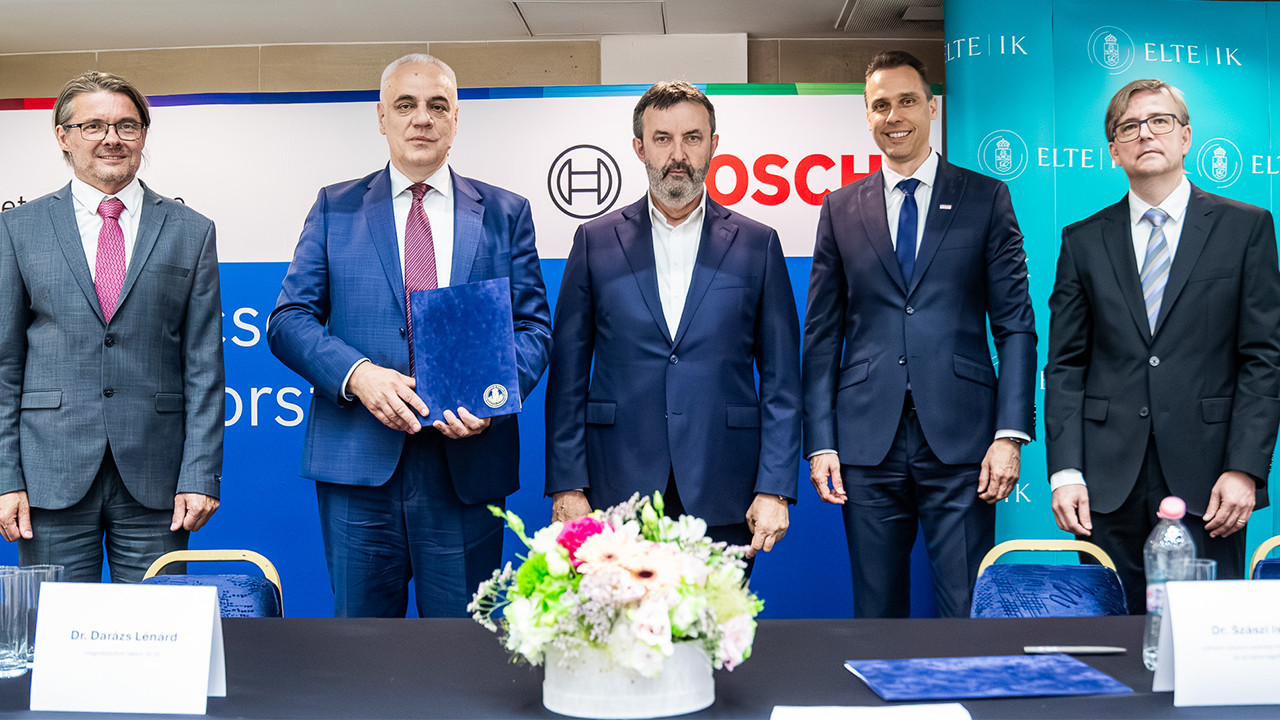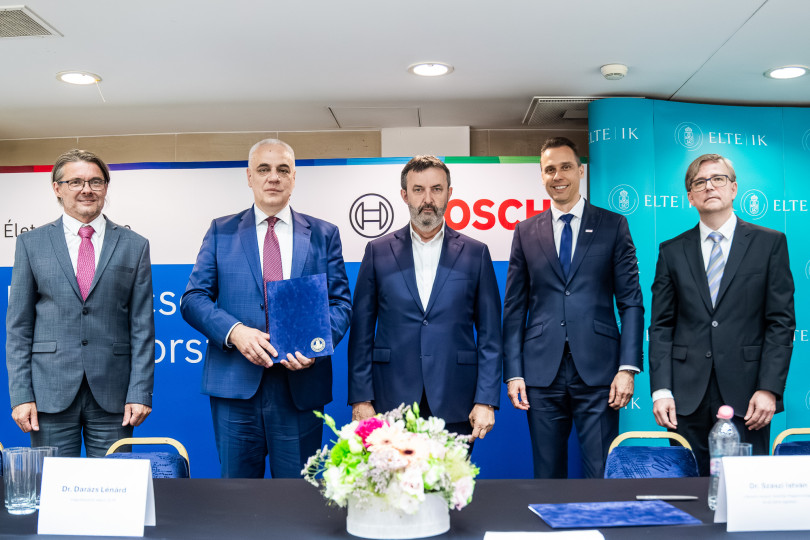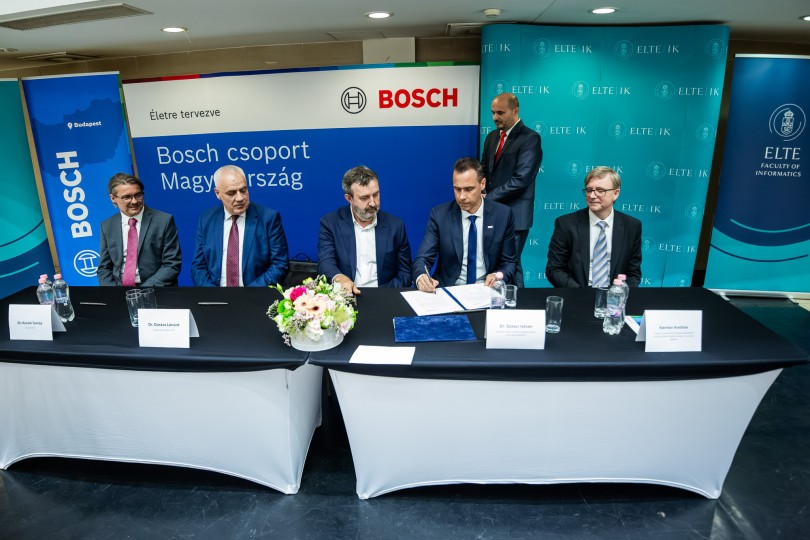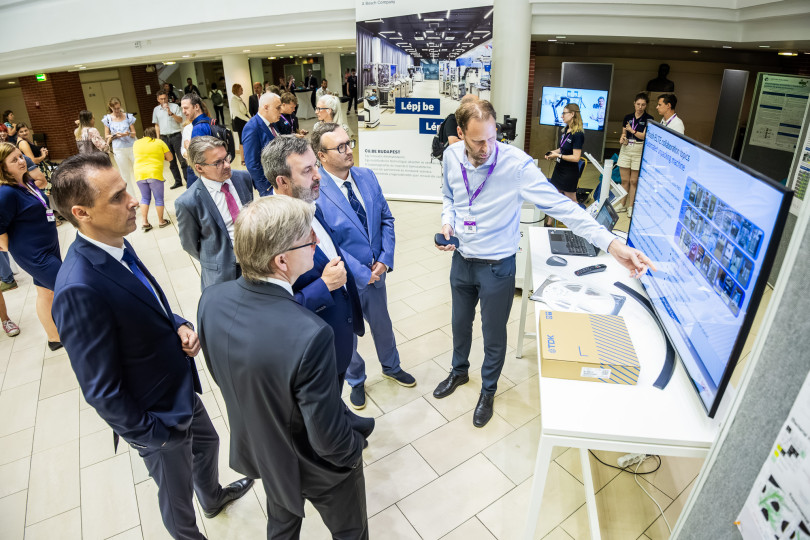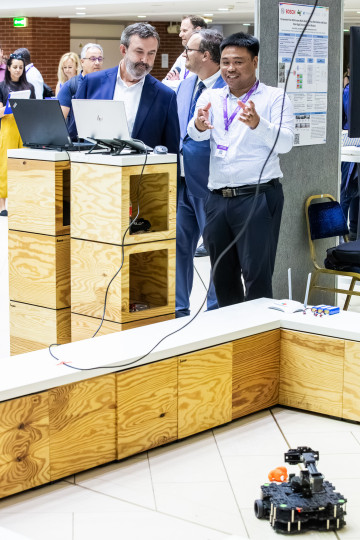Budapest, June 24, 2025 – With the support and partnership of the Bosch Group in Hungary, Hungary's first industrial department of artificial intelligence was founded in 2020 at the Faculty of Informatics of Eötvös Loránd University (ELTE). The ELTE-Bosch Department of Artificial Intelligence operates a research base and knowledge center where university lecturers, together with students and Bosch experts, can shape the common future of science and industry.
Representatives of ELTE and the Bosch Group in Hungary, with the participation of Dr. László Palkovics, Government Commissioner for Artificial Intelligence, signed an agreement to continue the cooperation for another 5 years, which unlocks new horizons in the field of domestic AI higher education and future-shaping AI developments that can be applied in practice. The long-term strategic goal is for the institution to become the most respected industrial department of applied artificial intelligence in Central and Eastern Europe.
University and industry: partnership plays a key role
For two decades, Bosch's strategy has included building an innovation ecosystem that reinforces the connection between higher education and industrial R&D. The company considers it important to work with the academic sector to shape the innovation industry and to participate in the training of new generations of engineers and IT professionals. “Bosch is dedicated to the development of artificial intelligence. We are convinced that we can create even more versatile solutions in the industrial application of AI together with our academic partners. We are proud of the results of the ELTE-Bosch collaboration over the past five years, and we believe in the success of the coming years. With the industrial department of artificial intelligence, we have created a professional workshop of outstanding quality, which not only provides up-to-date knowledge to the AI professionals of the future, but also offers practical solutions for the industry," said Dr. István Szászi, representative of the Bosch Group in Hungary and the Adriatic region.
The ELTE Faculty of Informatics considers the innovative utilization of university knowledge capital as its mission. The university believes that innovative ideas are founded on world-class knowledge and lead to success. However, the formula for success requires more than this: in the cooperation between industry and university, professional training, curriculum development, and talent management are all areas that complement and support research and development in a complex and strategic cooperation, and help create a critical mass of researchers. “By 2025, we have achieved the goals set at the outset, and we have laid the foundations for further growth. The joint initiative of the Bosch Group and the ELTE Faculty of Informatics raises the utilization of academic knowledge to a new level, thereby strengthening Hungary's place at the technological and economic forefront," emphasized Dr. Tamás Kozsik, Dean of the ELTE Faculty of Informatics.
From self-driving vehicles to automated factories
Collaboration is currently ongoing on nearly 30 different R&D topics at the ELTE-Bosch industrial department of artificial intelligence. The department's research contributes to the development and industrial application of, among other things, self-driving vehicles, machine vision, drone technology, robotics, and innovative systems that increasingly mimic human brain function.
A key area of cooperation between the university and the company is autonomous driving, which is connected to artificial intelligence in many ways. From sensing the external environment and the interior of the vehicle, to route planning and guiding the vehicle to its destination, a whole range of AI-based technologies are needed. The latest AI solutions play a key role in transforming data from various sensors into a virtual environment, planning vehicle movement, or even recognizing driver fatigue.
Computers that think like humans can support safety
Another exciting and internationally cutting-edge development trend related to automotive development is neuromorphic, i.e. AI-based computing inspired by the human brain, which is also being researched jointly by experts from Bosch and ELTE. Neuromorphic computing refers to the development of hardware and software systems that mimic the functioning of the human brain, with particular attention to the communication of neurons and the organization of neuronal networks. Neuromorphic computing can take the capabilities of ADAS systems, for example, to a new level.
Unpacking robot expected to enter operation soon
AI-based technologies also play an important role in production optimization: related developments are also underway at the ELTE-Bosch Department of Artificial Intelligence. Robotics is an effective tool for increasing productivity and combining it with AI offers almost endless possibilities for automating complex workflows. An important result of the ELTE-Bosch collaboration is a special industrial unpacking robot, which is expected to be deployed at the group’s Hatvan site. The equipment offers an efficient and flexible solution for the automated unpacking, sorting, and organization of raw materials, parts, and components that arrive in factories in a wide variety of packaging on a daily basis.
Smart camera system and digital twin technologies for failure detection
The research conducted at the department covers a wide spectrum. They are also working on developing a smart 3D camera system to detect and analyze different body poses and movements, which significantly simplifies current procedures and can therefore be easily used in the fields of sports, law enforcement, or healthcare (e.g. autism diagnostics). Research directions also include AI-based, so-called digital twin technology, which can help, among other things, with failure detection in industrial environments, or in the proper implementation of rehabilitation exercises in healthcare.
Future AI experts study here
Thanks to the ELTE-Bosch collaboration, university students can gain relevant practical experience and competitive professional knowledge at the department. A total of 250 students have enrolled in the Artificial Intelligence specialization led by the department over the past 5 years, of which 81 have so far obtained a master's degree. In connection with the training, the department provides 34 courses related to artificial intelligence, as well as the opportunity to participate in various industrial and research projects. A European Union double degree master's program will also be launched next academic year, focusing on emotional artificial intelligence. The launch of the Artificial Intelligence Master's Degree is currently underway in a consortium of 11 domestic higher education institutions, under the coordination of the ELTE Faculty of Informatics.
Professional and financial support for future AI engineers from Bosch
In addition to professional and industrial know-how, Bosch also played a role in developing the educational and community spaces of the industrial department of artificial intelligence with the New Way of Working concept. The company also supports students with scholarships and various grants. The ELTE Faculty of Informatics supports talented students participating in undergraduate studies through its Neumann program, while in master's courses, the BEST - Bosch Engineering Scholarship Team scholarship program provides financial assistance and professional mentoring to ambitious students with outstanding performance.
Zita Hella Varga
Phone: +36 70 667-6374
Bosch has been present in Hungary since 1898 with its products. After its re-establishment as a regional trading company in 1991, Bosch has grown into one of Hungary’s largest foreign industrial employers with currently nine subsidiaries. In fiscal 2024 it had total net sales of 2058 billion forints and consolidated sales to third parties on the Hungarian market of 313 billion forints. The Bosch Group in Hungary employs more than 17,400 associates (as of December 31, 2024). In addition to its manufacturing, commercial and development business, Bosch has a network of sales and service operations that covers the entire country.
The Bosch Group is a leading global supplier of technology and services. It employs roughly 418,000 associates worldwide (as of December 31, 2024). The company generated sales of 90.3 billion euros in 2024. Its operations are divided into four business sectors: Mobility, Industrial Technology, Consumer Goods, and Energy and Building Technology. With its business activities, the company aims to use technology to help shape universal trends such as automation, electrification, digitalization, connectivity, and an orientation to sustainability. In this context, Bosch’s broad diversification across regions and industries strengthens its innovativeness and robustness. Bosch uses its proven expertise in sensor technology, software, and services to offer customers cross-domain solutions from a single source. It also applies its expertise in connectivity and artificial intelligence in order to develop and manufacture user-friendly, sustainable products. With technology that is “Invented for life,” Bosch wants to help improve quality of life and conserve natural resources. The Bosch Group comprises Robert Bosch GmbH and its roughly 490 subsidiary and regional companies in over 60 countries. Including sales and service partners, Bosch’s global manufacturing, engineering, and sales network covers nearly every country in the world. Bosch’s innovative strength is key to the company’s further development. At 136 locations across the globe, Bosch employs some 87,000 associates in research and development.
Additional information is available online at www.bosch.hu, iot.boschblog.hu, www.bosch.com, www.iot.bosch.com, www.bosch-press.com, www.twitter.com/BoschPresse

